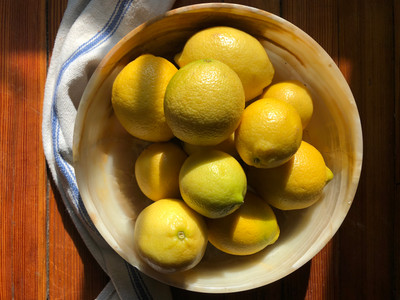Fresh lemons make their way into everything I make, whether it's a blueberry muffin, lemon sugar crepe, apple pie filling, lemon ginger tea, slow roasted chicken, or a bowl of roasted vegetables, I'm adding lemon zest or juice, probably both. My mom works and lives in my family's Florida citrus grove during the winter, and I feel stupid lucky to have access to fresh citrus from her weekly shipments up north, which have included case after case of perfectly thin skinned, neon yellow lemons of a couple different varieties. I love a lemon of any kind, but there's an heirloom variety in our grove that just kills me with its scent- more floral than a meyer lemon, with a crazy amount of juice thanks to it's low amount of pith (the white fibrous membrane layer just under the peel.)
Preserved lemons were something on my radar for years, but I didn't get around to making them until last year because I'm late to everything, literally and figuratively. They're an incredibly easy ferment to make, only requiring two ingredients: lemons and salt. Once the lemons are fermented, I love lemon peels added to grain salads, roasted potatoes with olive oil + oregano, salad dressings, hummus, and savory yogurt to dip roasted veg into. The leftover brine is purportedly good in a bloody mary.
Do use organic lemons here, as you'll be using the entire lemon including the exterior peel. Many recipes call for meyer lemons, but I enjoy other varieties too- just try to choose lemons that are heavy for their size, their heavy juice content will work well here.
Ingredients:
-organic lemons, washed (reserve a few whole, in case you need extra lemon juice at the end)
-kosher salt
Tools:
Wide mouth glass jar
Method:
1.
Cut the "nubs" off the end of each lemon, so you have a flat end on each side. Stand lemons up on one flat end, and cut an "X" into each lemon, stopping the cut before you go through the other end of the lemon. You want the bottom of the lemon to stay intact to hold the lemon together like a partially opened flower.
2.
Pack each partially opened lemon with as much kosher salt as you can fit into the cavity (about 1 tablespoon), then place each salt packed lemon in jar. Using clean hands or a mallet, firmly press down on the lemons to release their juice, continue until lemons are submerged. If the lemons aren't submerged in juice after a couple minutes of pressing them, juice a couple lemons and add juice to jar along with a small handful of salt.
3.
Let lemons ferment at room temperature, with a loose lid (don't use a metal lid as the acid from the lemons will cause the metal to corrode) or cheesecloth on the jar. Depending on the room temperature, the lemons will take around 3-4 weeks to ferment- warmer temperatures cause faster fermentation. Give the jar a shake every few days. Once a few weeks have passed, and the lemons have become somewhat translucent, store them in the refrigerator. I've never been able to keep a batch around for too long, but you should be able to keep them refrigerated for up to a year as long as all lemons remain submerged in brine.











Comments